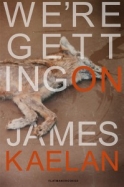by David Backer
(1) Personal Situation of Author Re: Novel-Under-Review
I’m writing this review on a computer in New York City, 9 January 2011. I’m wearing one sweatshirt, one button-down shirt, one t-shirt, two socks, one pair of gray pants, one pair of underwear, one pair of glasses (transition lenses). I’m sitting in a heated apartment. I ate chinese food for dinner (takeout). Four lamps are on. The computer is a MacBook. It’s connected to the Internet via a wireless router. I’m writing this review using American English and a complex of Judeo-Christian-Humanist ideologies.
Each of these necessitates a technology: computer, router, apartment, lamp, language, abstract construct, etc. These technologies are the result of human “progress”: linguistic, conceptual, industrial, etc. I assume James Kaelen used a similar number and kind of them to write We’re Getting On, a novella that presents the nauseating question: Do any of these technologies really constitute progress?
(2) Connection to Western Philosophy
In The Open Society Karl Popper characterizes the ancient Heraclitus’ philosophy as having one unchanging principle: everything changes. There’s a fire that consumes and puts all into flux. Plato, Popper writes, gives this philosophy a moral direction: not only does everything change, but everything degenerates. Things unravel. They get worse. Chaos ensues. Humanity can survive this degeneration well (Plato would call this “justice”) if it has the wherewithal to stand against it by creating and maintaining institutions. If we don’t, degeneration will ruin us. So we must move. We must act, either by creating sets of principles in accordance with past ideals and obeying them (as Plato would have it) or constantly revising our principles (as any modern or postmodern progressive/radical critique would have it). In this way progressives, conservatives, and radicals share the same assumption: we must have some set of principles and work tirelessly in their name. If we don’t then things will fall apart.
But in the end this war is based on Plato’s moral assumption about flux. What if things don’t necessarily degenerate? What if all this “progress” and “advancement” in the fight against degeneration is just “interference” with the stateless state of things: just different kinds of noise, an absurd cacophony, in reaction to the terrifying purity of essence-less thingness? What if the war against degeneration has been fought in vain? What if the degeneration assumption itself was the enemy the whole time? Here we have an existentialist question, and Kaelen’s favored stance (at least it seems this way from the Beckett quotation at the beginning).
(3) Application to Novel-Under-Review, Author’s Opinion
Kaelen tells his story from the point of view of the leader of a small movement bent on “regressing” (read: advancing) through the different stages of human technological “advancement” (read: regression). No buildings, fabricated materials, or tools. No horticulture or, eventually, clothes. The idea is to arrive at nothing, to “get on” to a basic state of nature, the one that so many philosophers in and around the beginning of industrialization fantasized (Rousseau and Thoreau come to mind quickest). Kaelen’s contribution to this dialectic is fast and severe, pared down to best essentials. By my lights the book is very good: symmetrical, responsible, pragmatic, penetrating, even touching at times. It gives picaresque portraits of its characters, particularly Erin, the love interest of the ego-eco-maniacal leader of the group.
The book–in tune with its existentialist platform–nauseates, embodying the question of brute thingness, giving the existentialist concepts mud (covering everything) and skin (cut, calloused, bleeding) and teeth (falling out). It forces me towards an awareness of how much I’m ensnared in technology; how ineluctably I’m entangled in what we’ve all decided is “progress;” how faithfully I’m enlisted in the war against degeneration; how I might be on the wrong side; how, just as “north”, “south”, “up”, and “down” are fabrications made in the name of the fight, there might actually be no such thing as a “side.”
Oddly enough, the book’s cover is made from seeds. It may be planted and, if cared for, nurtured into a spruce tree. The tension in this worthwhile book is clear from cover to cover: what is generation, and what will our generation do about it?
This post may contain affiliate links.









